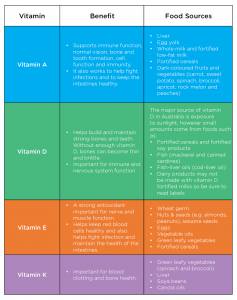Fat-Soluble Vitamins
People with CF, particularly those with pancreatic insufficiency, are at risk of developing ‘fat-soluble’ vitamin deficiency. Fat soluble vitamins include Vitamin A, D, E and K. Fat soluble vitamin deficiency can result from poor fat digestion and not taking enzymes correctly. Other factors which may contribute include poor dietary intake, liver disease, bowel resection and late diagnosis.
Deficiencies in these important vitamins could affect the health of your bones and eyes, as well as the body’s ability to fight infections. Whilst these fat-soluble vitamins are found naturally in some foods, most people with CF will require daily multivitamin supplementation to prevent fat soluble vitamin deficiency.
VitABDECK is a CF specific multivitamin that is generally prescribed to people with CF. To enhance their effectiveness, they should be taken with enzymes and a fat-containing food or drink. You may need to take an additional single nutrient vitamin supplement, such as Vitamin D. Your dietitian will be able to recommend your specific daily requirement.
Vitamin levels should be checked at least once a year at annual review and more frequently if indicated.

Probiotics
There are both ‘good’ and ‘harmful’ bacteria naturally occurring in the body. This balance of bacteria naturally found in the body, can be disturbed by medications such as antibiotics or from infection, stress, poor diet and illness.
Probiotics are ‘good’ microorganisms (such as bacteria or yeast) with proven health benefits when taken in the right amounts. Probiotics may be used to assist in balancing the ‘good’ and ‘harmful’ bacteria in the gut.
There is emerging evidence regarding the health benefits of probiotics in CF, however, at present there are no specific recommendations for regular probiotic use in individuals with CF. There are many species and strains of probiotics, each with an individual mechanism of action. There is currently not enough evidence to suggest a specific probiotic strain over another, as being more beneficial in CF.
Whilst probiotics may provide health benefits, consideration must be taken regarding the cost, usage and impact on burden on medication adherence.
If you’re wanting to trial a probiotic, it is highly recommended that you discuss this with your CF team to determine what the best option is for you.
Sports Supplements
Sports supplements are not normally required if you are eating a balanced diet. Special sports foods, such as energy bars and carbohydrate gels are available and can be of benefit when participating in endurance events. It is important to ensure additional adequate hydration and sodium replacement when exercising.
Protein Supplements
If you are eating enough food to meet your energy needs for exercise, it is likely you will be eating enough protein too. Drinking plenty of milk-based drinks or nourishing fluids will have a similar effect to drinking protein supplements and will cost you less.
Always talk with your dietitian before taking any protein or sports supplements. They may contain substances that interact with medications.